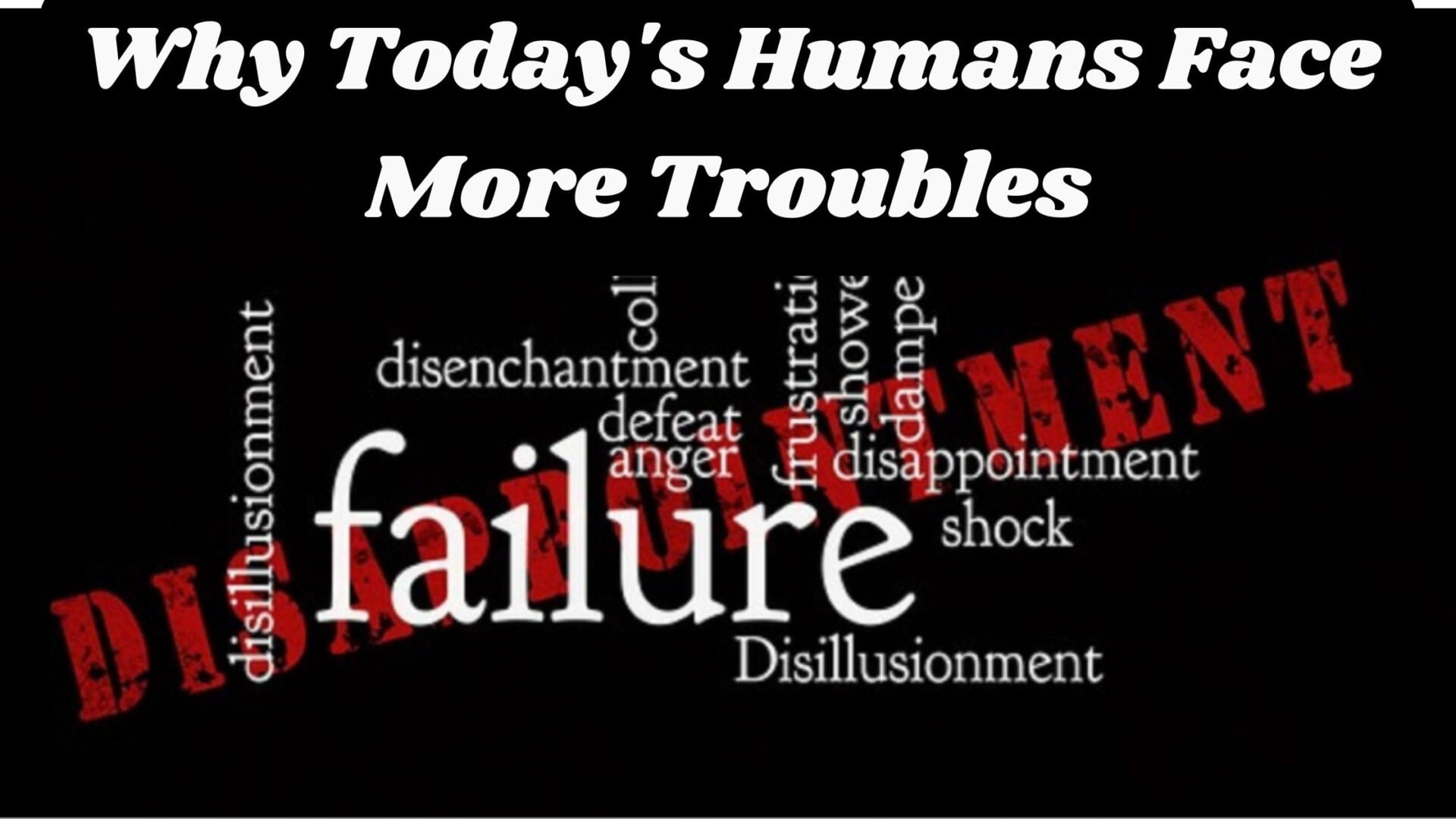Introduction
The Changing Landscape: Why Today’s Humans Face More Troubles

In the fast-paced, technology-driven world of the 21st century, it’s undeniable that modern humans are facing a myriad of challenges that their ancestors could hardly have imagined. From increased stress levels to the impact of technology on our lives, the landscape of human existence has undergone profound changes. In this article, we will explore the reasons behind why today’s humans seem to be dealing with more troubles than ever before and how these challenges have shaped our lives.
What are the underlying reasons that have led to the perception that today’s humans are facing more troubles than ever before, and in what ways have these challenges influenced and molded our lives?
- The Rise of Technology
One of the most significant factors contributing to the troubles faced by today’s humans is the rapid advancement of technology. While technology has brought about many conveniences and innovations, it has also introduced a host of new challenges.
a. Digital Overload: The constant barrage of information through smartphones, social media, and the internet has created what is often referred to as “digital overload.” This constant connectivity can lead to stress, anxiety, and an inability to disconnect from work or social pressures.
b. Cybersecurity Concerns: As we become increasingly reliant on digital platforms, the threat of cyberattacks and data breaches has grown substantially. The fear of identity theft and privacy invasion is a modern worry that our ancestors never had to contend with.
c. Social Media Pressure: Social media platforms have created an environment where individuals feel pressured to present an idealized version of their lives. This can lead to feelings of inadequacy and low self-esteem, contributing to mental health issues.
- Economic Pressures
The global economy has evolved significantly in recent decades, leading to new economic pressures on individuals and families.
a. Income Inequality: The gap between the wealthy and the rest of the population has widened, leading to increased financial stress for many. The fear of falling behind economically can create significant anxiety.
b. Job Insecurity: In a rapidly changing job market, job security is no longer guaranteed. The gig economy and automation have created uncertainty about stable employment, leading to concerns about financial stability.
c. Student Loan Debt: Many individuals carry substantial student loan debt, which can be a significant financial burden. This debt can delay important life milestones such as buying a home or starting a family.
- Environmental Challenges
The environment is undergoing significant changes due to climate change and other environmental issues. These changes bring about new challenges for today’s humans.
a. Climate Anxiety: The increasing frequency of natural disasters and the threat of climate change have given rise to “climate anxiety.” Concerns about the future of the planet can lead to feelings of helplessness and despair.
b. Resource Scarcity: As the global population continues to grow, there are concerns about the availability of essential resources such as clean water and food. Resource scarcity can lead to conflicts and geopolitical tensions.
c. Health Risks: Environmental changes can also impact human health, with the spread of diseases and the degradation of air and water quality posing significant health risks.
- Social and Political Unrest
Today’s humans are living in a world marked by social and political turmoil.
a. Political Polarization: Divisive political ideologies and increased polarization have created a sense of social unrest. This can lead to frustration and anxiety about the state of society.
b. Social Injustice: Heightened awareness of social injustice issues has led to important conversations and movements, but it has also brought to light the deep-seated problems within society. This can be emotionally distressing for many.
c. Global Conflicts: The world is still grappling with conflicts and tensions in various regions. The fear of global instability and the possibility of conflict can create a sense of unease.
How should today’s man positively face the major challenges in life?
Positively facing the major challenges in life requires a combination of resilience, adaptability, and a proactive mindset. Here are some strategies for today’s individuals to navigate life’s challenges effectively:

- Mindfulness and Self-Awareness:
- Begin by understanding your thoughts, emotions, and reactions. Mindfulness techniques, such as meditation, can help you become more self-aware.
- Acceptance:
- Acknowledge that challenges are a natural part of life. Acceptance doesn’t mean resignation but rather recognizing the reality of the situation.
- Set Realistic Goals:
- Break down larger challenges into smaller, more manageable goals. This can make the journey less overwhelming and help you stay focused.
- Seek Support:
- Don’t hesitate to reach out to friends, family, or professionals for support and guidance. Talking to others can provide fresh perspectives and emotional comfort.
- Healthy Lifestyle:
- Prioritize physical and mental health through regular exercise, a balanced diet, and adequate sleep. A healthy body and mind are better equipped to handle challenges.
- Problem-Solving Skills:
- Develop effective problem-solving skills. Identify the root causes of your challenges and explore potential solutions. Consider seeking advice from mentors or experts.
- Embrace Change:
- Understand that change is a constant in life. Be adaptable and open to new opportunities that may arise from challenging situations.
- Learn from Mistakes:
- Mistakes are valuable lessons. Instead of dwelling on failures, focus on what you can learn from them to avoid making the same errors in the future.
- Build Resilience:
- Resilience is the ability to bounce back from adversity. Cultivate this trait by facing challenges head-on, learning from setbacks, and maintaining a positive outlook.
- Time Management:
- Efficiently manage your time and prioritize tasks. This can reduce stress and help you tackle challenges one step at a time.
- Seek Professional Help:
- When facing significant mental health challenges, consider seeking support from therapists or counselors. They can provide valuable guidance and coping strategies.
- Stay Informed and Educated:
- Keep yourself informed about the specific challenges you face. Knowledge can empower you to make informed decisions and find solutions.
- Maintain a Supportive Social Network:
- Nurture meaningful relationships with friends and loved ones who can provide emotional support during tough times.
- Practice Gratitude:
- Focus on the positive aspects of your life and express gratitude for them. This can boost your overall well-being and resilience.
- Stay Patient:
- Understand that overcoming major challenges may take time. Be patient with yourself and your progress.
- Visualization and Affirmations:
- Visualize a successful outcome and use positive affirmations to reinforce your belief in your ability to overcome challenges.
Remember that facing life’s major challenges positively is an ongoing process. It involves personal growth and continuous self-improvement. By applying these strategies and maintaining a positive mindset, individuals can navigate challenges with resilience and ultimately emerge stronger from the experience.
Conclusion
The changing landscape of the modern world has undoubtedly brought about new challenges and troubles for today’s humans. From the impact of technology on our lives to economic pressures, environmental challenges, and social and political unrest, these issues shape our daily experiences and influence our mental and emotional well-being.
It’s crucial to recognize that while these challenges are significant, they also present opportunities for growth, resilience, and positive change. By acknowledging and understanding the sources of our troubles, we can work collectively to find solutions and build a better future for ourselves and generations to come. In the face of adversity, humans have always demonstrated remarkable adaptability, and it is through this adaptability
FAQs: Why Today’s Humans Face More Troubles
Q1: What are some of the major troubles faced by humans today?
A1: Humans today face a myriad of troubles, including:
- Mental health issues: Increased rates of anxiety, depression, and other mental health disorders.
- Economic challenges: Income inequality, job insecurity, and the rising cost of living.
- Environmental concerns: Climate change, pollution, and natural resource depletion.
- Political instability: Conflicts, polarization, and erosion of democratic institutions.
- Technological impacts: Privacy issues, cyber threats, and the effects of social media on well-being.
Q2: How has technology contributed to the troubles faced by humans today?
A2: Technology has both positive and negative impacts. While it has improved communication, healthcare, and convenience, it also:
- Facilitates the spread of misinformation.
- Increases screen time, contributing to mental health issues.
- Leads to job displacement due to automation.
- Creates privacy concerns with the collection and misuse of personal data.
Q3: Why is there an increase in mental health issues among today’s population?
A3: Several factors contribute to the rise in mental health issues:
- Social media: Comparison culture and cyberbullying.
- Economic stress: Job insecurity and financial pressures.
- Isolation: Less face-to-face interaction and community engagement.
- Lifestyle changes: Sedentary lifestyles and poor work-life balance.
References
- Mental Health America. (n.d.). Mental Health and COVID-19: Impacts on People of Color. Retrieved from MHA.
- The World Bank. (2021). The Economic Impact of COVID-19: Can Policy Make a Difference? Retrieved from World Bank.
- United Nations. (2021). Climate Change 2021: The Physical Science Basis. Retrieved from UN.
- Pew Research Center. (2020). The Role of Technology in the Lives of Low-Income Americans. Retrieved from Pew Research.
- World Health Organization. (2020). Depression and Other Common Mental Disorders: Global Health Estimates. Retrieved from WHO.
- International Organization for Migration. (2021). World Migration Report 2022. Retrieved from IOM.
Learn more….







